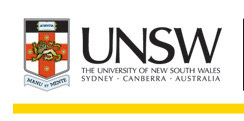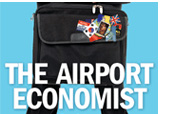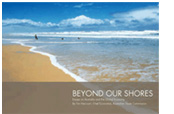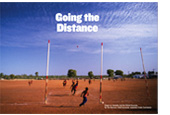By Tim Harcourt*
When I was at ACTU, everyone was there wanting to be the Prime Minister one day (or at least get into Parliament). In fact, the then ACTU Secretary Bill Kelty told us that there were a few potential future PMs amongst us when we had the rare staff meeting (usually after an election). This is not surprising the job as I had at the ACTU as the research officer had originally been filled by Bob Hawke who became a very successful PM and Ralph Willis, who became Treasurer. ACTU Presidents Simon Crean and Martin Ferguson are currently in Parliament and Cabinet (Jennie George also made it to the green leather) and two potential Labor PMs Bill Shorten and Greg Combet also distinguished themselves in the trade union movement before running for Parliament and also becoming Cabinet Ministers.
But in hindsight, when I think about it, instead of looking to Parliament some of us young ACTU research officers should have been thinking about trying to join another powerful and influential institution in Australian civic life – the Australian Football League (AFL).
You only have to look closely at the evidence and the data (and not just the on field footy stuff Bruce McAvaney quotes) to see how important the AFL is in the Australian Economy and Society at large.
Here are just a few examples of the influence of the AFL and the leadership it brings to Australian economic life.
Firstly there’s a matter of membership numbers (as Graham Richardson says, give me the numbers any day).
According to the AFL, there are now 707,621 members which have risen every year since 2001 (with the only drop in the last two decades being in 2000 during the Sydney Olympics). Collingwood leads the way with 72,688 one eyed members followed by Hawthorn on 60,841 and West Coast on 57,377. According to the AFL’s Phil Martin, 1/33 Australians belong to an AFL Club, with significant corporate and community influence on top of that.
Secondly, there’s the business impact of the AFL. When I was with Austrade I once helped the AFL set up a game between the Crows and Collingwood in the United Arab Emirates. Why? Partly the game was to service the expatriate market (Dubai and Abu Dhabi have lots of Aussie residents). And partly to support Emirates who sponsor Collingwood and Toyota who support the Crows (with the UAE and Saudi Arabia being major export markets for the Toyota Camry).
It works the other way too. Foreign investors who want to get some profile in the Australian market look at the AFL for its national reach. Companies like Hyundai (who have sponsored Carlton) Kaspersky (Melbourne) and of course Emirates, have seen sport – particularly the AFL – as a great way to get their brand known in Australia.
Thirdly, the AFL has shown it has the ability to recruit in new territories – recruiting in the non traditional areas that have been typically rugby league dominated. In this sense, the AFL has set a good example to trade unions and political parties suffering from declining membership.
Take the AFL’s recent ’Northern Exposure’ expansion teams the GWS Giants and Gold Coast Suns. They haven’t won many games on the field yet but the business impact regionally has been immediate (although GWS did produce 8 rising stars this year – an AFL record).
On the Gold Coast, the Suns have recruited just 11 000 members in their second season and have averaged 13,700 per game at their new state of the art ground, Metricon Stadium. According to the Suns, during Metricon’s first year of operation 110,000 of those who attended Suns home matches were visitors from outside of the Gold Coast and the team brought in almost 165,000 over nighters during their first year of AFL competition. This was much needed given the flat state of domestic tourism after poor weather conditions in South East Queensland. With great support from the Gold Coast City Council, the Suns have been excelled off the field with the team surpassing its economic contribution target to reach almost $50 million from inception. There have been added benefits of the Suns to the Gold Coast community including support for the arts such as the ‘Bleach – Surfing the fringe festival’ run by the dynamic Louise Bezzina, and the use of Metricon for concerts by the Foo Fighters ($5.5 million impact with 38,000 attendees) and of course the opening and closing ceremony track and field events at the 2018 Commonwealth Games.
In western Sydney, the GWS Giants have recruited over 10,000 members in their first year and have achieved average crowds of 11,000 per game in both Sydney and Canberra (including an aggregate of 60,000 for both Sydney ‘derbies’ against the Swans). GWS achieved $20 million in extra media exposure in month leading up to first game, with some innovative techniques introduced by Coach Kevin Sheedy and GWS Corporate Affairs head (the former Channel Nine and ABC journalist and AFL Official) Nick Johnston. Having Sydney journalists in the box with ‘Sheeds’ and having injured players commentate for the ABC have shown how open and accessible the GWS Giants have been to the Sydney, Canberra and national media. Corporately the GWS have made a splash under the leadership of CEO Dave Matthews with a $65 million investment in Skoda stadium. Another major ‘capital injection’ has occurred with the GWS commitment to Canberra with the inaugural Prime Minister’s Cup match against Julia Gillard’s beloved Western Bulldogs. The GWS have attracted some major heavy hitters in Sydney business and media circles too such as Steve Waugh, Sunrise’s Melissa Doyle, and GWS chair is also the chair of the powerful Business Council of Australia, Tony Shepherd.
Fourthly, the AFL does its bit for international diplomacy by building international links. Recently AFL’s Phil Martin hosted the Latin American Ambassadors at an event in Melbourne to introduce the likes of Brazil, Argentina, Chile and Uruguay to the great Australian game. Many trade and diplomatic delegations get treated to a game when they are in Australia and even GWS Coach Kevin Sheedy and yours truly spoke at an even ‘Look West – Western Sydney and Western China’ to the Australian China Business Council. Sheedy’s work in the corporate world in Sydney as well as in the western Sydney communities has been phenomenal. The AFL has organised an international AFL competition with teams from Ireland, PNG, and Denmark etc. And in a rare example of football diplomacy they sponsored a joint Israel & Palestine Peace Team coached by Dipper. (It was great to hear someone yell out at the game “C’mon umpire give Peace a chance”). On the field too, there have been NAB Cup and exhibition games in the UAE, South Africa, China and now the game between St Kilda and the Swans across the ditch in Wellington for premiership points next ANZAC Day.
Finally, the AFL plays an important role in civic leadership and social issues. The AFL has taken a strong role on equal opportunity whether it be promoting female membership, running campaigns about anti-racism messages, anti-homophobia and indigenous rights. Indigenous players, who make up nearly 12 per cent of the AFL player roster, have been an important part of the AFL’s international efforts with Indigenous legends like Michael Long and Mick O’Loughlin taking Indigenous team (the Boomerangs) to the townships of South Africa as well as working with local communities. The AFL has been an important player in building Reconciliation and respect between people within our nation too.
So as we wait for another classic AFL Grand Final, all you young aspiring Prime Ministers on all sides of the political spectrum, do you really want to go into Parliament or do you want to have real influence – by running the AFL? ACTU Secretary Bill Kelty didn’t run for Parliament, but became an AFL Commissioner instead. Bill always was an astute sort of fellow! Whether it came to economics, politics in issues like superannuation and football, Bill was always ahead of his time.
*Tim Harcourt is the JW Nevile Fellow in Economics at the Australian School of Business, UNSW and author of The Airport Economist: www.timharcourt.com He played amateur league for the Adelaide University Football Club with the legendary Bob Neil.
Thanks to Phil Martin, Shannon Gill & James Tonkin of the AFL, Dave Matthews, Nick Johnston and Kevin Sheedy from the GWS, Jason Sintome of the Gold Coast Suns, and Ross Giudice of the Gold Coast City Council for their assistance.













No Comments so far ↓
Comments are closed.